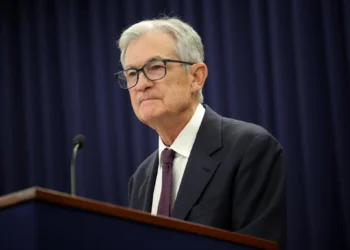FRANKFURT (Realist English). Inflation across the eurozone slowed further in October, edging closer to the European Central Bank’s 2% target, according to preliminary data released by Eurostat on Thursday.
Annual inflation in the 19-member bloc eased to 2.1%, down from 2.2% in September, matching economists’ expectations and marking the lowest level in more than three years. On a monthly basis, prices rose 0.2%, slightly higher than the 0.1% increase recorded in September.
The data reinforces the ECB’s view that inflation is steadily retreating after the post-pandemic price surge, though officials remain wary of underlying pressures — particularly from services and wages.
Core inflation, which excludes food and energy, held steady at 2.4%, defying forecasts for a slight decline. Services inflation accelerated to 3.4% from 3.2%, continuing to drive overall price growth, while prices for food, alcohol, and tobacco eased to 2.5%. Energy prices remained in negative territory, falling 1% year on year.
Among eurozone members, Estonia (4.5%), Latvia (4.2%), and Austria (4.0%) recorded the highest annual inflation rates, while Cyprus (0.3%) and France (0.9%) saw the lowest.
ECB holds rates steady, eyes wage risks
The ECB kept interest rates unchanged at its October meeting — the third pause in a row — leaving the deposit rate at 2.00% as policymakers assess whether inflation is sustainably converging toward target.
Speaking in Florence, ECB President Christine Lagarde welcomed the decline in inflation but warned against complacency.
“Inflation remains close to our two per cent medium-term target, but vigilance is still warranted,” Lagarde said. “We are in a good place — though not yet ready to declare victory.”
Lagarde highlighted potential supply chain disruptions, especially in critical raw materials and sectors such as energy and automotive, as possible upside risks. She also pointed to wage growth as a key factor influencing services inflation.
“We are in a wait-and-watch mode,” she said, stressing that future decisions would remain data-dependent.
Market reaction muted
The euro traded little changed around $1.1570 following the release, while German 10-year Bund yields ticked up to 2.65%, a two-week high.
European equities slipped slightly, with the Euro STOXX 50 down 0.4% and the STOXX 600 off 0.5%. Germany’s DAX and France’s CAC 40 fell modestly, while Italy’s FTSE MIB edged 0.5% higher.
Economists said the latest data strengthens expectations that the ECB will keep rates on hold into early 2026, barring a fresh inflation shock.


















